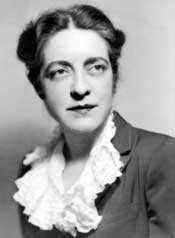Melba Phillips
| Melba Phillips | |
|---|---|
 | |
| Born |
February 1, 1907 Hazleton |
| Died |
November 8, 2004 (aged 97) Petersburg, Indiana |
| Doctoral advisor | J. Robert Oppenheimer |
Melba Newell Phillips (February 1, 1907 – November 8, 2004) was an American physicist and science educator. She completed her doctoral studies under J. Robert Oppenheimer and was also known for refusing to testify before a U.S. Senate Judiciary Committee's subcommittee on internal security, her actions leading to her dismissal by Brooklyn College.
Life
Melba Phillips was born in Hazleton, Indiana. She graduated from high school at the age of 15 and went on to study Mathematics at Oakland City College, Indiana graduating in 1926. She received a master's degree in physics from Battle Creek College of Michigan in 1928 and her doctorate in physics in 1933 at the University of California, Berkeley.
Phillips's supervisor at Berkeley was J. Robert Oppenheimer, who would later become scientific head of the Allied atomic bomb effort, the Manhattan Project. Together they described the Oppenheimer-Phillips effect explaining the behaviour of accelerated nuclei of radioactive hydrogen atoms in 1935.
Phillips took up her first teaching position at the Connecticut College for Women in 1937, moving on to Brooklyn College in 1938. While at the College she helped organize the founding of the Federation of American Scientists in 1945. During World War II she taught at the University of Minnesota, returning to Brooklyn College after the war. Highly regarded as a physics educator, she was fired from the College in 1952 when she refused to testify before the McCarran internal security subcommittee during the McCarthy era. Brooklyn College publicly apologised to Phillips in 1987.
While unemployed Phillips wrote two textbooks, Principles of Physical Science (1957), with Francis Bonner, and Classical Electricity and Magnetism (1955), with Wolfgang Panofsky.
Phillips returned to teaching in 1957, when she became associate director of a teacher-training institute at Washington University in St. Louis. In 1962 she took up a position at the University of Chicago, under her guidance the university began teaching physical science courses to non-science majors. She retired from the University in 1972. After retiring in 1972, she worked as a visiting professor at the State University of New York at Stony Brook, until 1975 and at the Graduate School of the University of Science and Technology of China, Chinese Academy of Science, in Beijing in 1980.
She was active in the American Association of Physics Teachers (AAPT), throughout her career. She was also an elected fellow of the American Physical Society and the American Association for the Advancement of Science.
Phillips died of coronary artery disease on November 8, 2004 in a nursing home in Petersburg, Indiana.
Publications
- Principles of Physical Science. 1957. Addison-Wesley Publishing Co
- On Teaching Physics: Reprints of American Journal of Physics Articles from the First Half Century of AAPT (50 Years). 1980. American Association of Physics Teachers ISBN 0-318-41540-2
- Physics History from AAPT Journals. 1985. American Association of Physics Teachers ISBN 0-917853-14-8
- History of Physics (Readings from Physics Today, No 2). 1985. AIP Press ISBN 0-88318-468-0
- The Life and Times of Modern Physics: History of Physics II (Readings from Physics Today, No 5). 1993. AIP Press ISBN 0-88318-846-5
- Classical Electricity and Magnetism, Second Edition. 2005. Dover Publications ISBN 0-486-43924-0
References
- University of Chicago News Office - Melba Phillips, physicist, 1907-2004
- Summary of an Interview with Melba Phillips
Further reading
- Lebowitz, J; Panofsky, W; Rice, S (2005). "Melba Newell Phillips". Physics Today 58 (7): 80–81. Bibcode:2005PhT....58g..80L. doi:10.1063/1.2012480.
External links
|